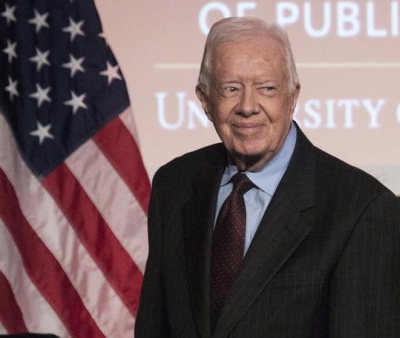Jimmy Carter, the 39th US President who died at the age of 100, shared a unique connection with India and a village in Haryana was named Carterpuri in his honour during his visit to the country in 1978.
Carter, who was considered a friend of India, died peacefully on Sunday at his home in Plains, Georgia surrounded by his family. He was the longest-living president in US history. He was the first American president to visit India after the removal of the Emergency and the victory of the Janata Party in 1977.
In his address to the Indian Parliament, Carter spoke against authoritarian rule and praised India for its democracy.
"India's difficulties, which we often experience ourselves and which are typical of the problems faced in the developing world, remind us of the tasks that lie ahead. Not the Authoritarian Way," Carter said on January 2, 1978.
"But India's successes are just as important because they decisively refute the theory that in order to achieve economic and social progress, a developing country must accept an authoritarian or totalitarian government and all the damage to the health of the human spirit which that kind of rule brings with it, he told members of parliament. Is democracy important? Is human freedom valued by all people?... India has given her affirmative answer in a thunderous voice, a voice heard around the world. Something momentous happened here last March, not because any particular party won or lost but rather, I think, because the largest electorate on earth freely and wisely chose its leaders at the polls. In this sense, democracy itself was the victor," Carter said.
A day later at the signing of the Delhi declaration along with then Prime Minister Morarji Desai, Carter said at the heart of the friendship between India and the US is their determination that the moral values of the people must also guide the actions of the states and the governments.
The United States gave the world an illustration of a new form of government, with a new relation between the citizen and the state a relation in which the state exists to serve the citizen, and not the citizen to serve the state, he said.
"India experimented with creating political unity from overwhelming human diversity, enabling people of different cultures and languages and religions to work together, both in independence and also in freedom. Yours is an experiment whose success the world is celebrating anew," Carter said in the Ashoka Hall of the Rashtrapati Bhawan. -- PTI
According to the Carter Centre, on January 3, 1978, Carter and then First Lady Rosalynn Carter travelled to the village of Daulatpur Nasirabad, an hour southwest of New Delhi. He was the third American president to visit India and the only one with a personal connection to the country as his mother, Lillian, had worked there as a health volunteer with the Peace Corps during the late 1960s.
The visit was so successful that shortly after, village residents renamed the area 'Carterpuri' and remained in contact with the White House for the rest of President Carter's tenure," the Carter Centre said. "The trip made a lasting impression: Festivities abounded in the village when President Carter won the Nobel Peace Prize in 2002, and January 3 remains a holiday in Carterpuri," the centre said, adding that the visit laid the groundwork for an enduring partnership that has greatly benefited both countries.
President Carter understood that shared democratic principles formed a strong foundation for a long, fruitful relationship between the US and India. It is, therefore, no surprise that the two nations grew steadily closer in the decades after he left office, it said. -- PTI
